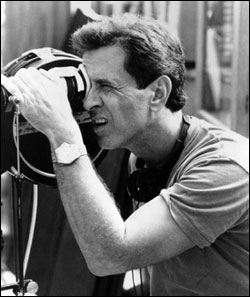WITH A LITTLE help from his friends, Dan Ireland gave us the Seattle International Film Festival, the second comings of Ken Russell and Vincent D’Onofrio, and Renée Zellweger’s arrival as a movie star like Cinderella on a rocket sled. In Ireland’s reunion interview with Zellweger on the new DVD of The Whole Wide World (see below), she explains that it was World that convinced Cameron Crowe she could play a grown-up (as she did in Crowe’s subsequent Jerry Maguire), and D’Onofrio who taught her to act. Since she says Crowe wouldn’t have cast her if Ireland hadn’t first, I figure Crowe owes props to him. And everybody owes plenty to Olivia d’Abo’s baby, whose surprise conception forced Ireland to consider replacing her with Zellweger.
“I didn’t even want to see Renée,” says Ireland, who visited Seattle’s W Hotel recently to hawk his latest, Passionada (see review, p. 81) “But her manager was relentless. She came in wearing this low-cut red dress, chewing gum, great big red earrings, and lips painted red. She was intoxicating.” World was a succès d’estime. “Pauline Kael basically came out of retirement to [rave about] it,” Ireland recalls. Having made a great movie about a suicidal weirdo’s talky, unconsummated romance, he seemed poised to make a daring Van Sant-like leap from the Northwest to the red-hot center of Hollywood.
But time was unkind to Ireland the Contrarian. He had saved World from meddlesome superiors who demanded nude fantasy sequences: “I told the editor, ‘Get the negative, say you need to check it, and throw it in the garbage. There were all these naked women popping up behind rocks. I have it somewhere on tape.” Any Zellweger naughty bits? “God, no! If you can get her in a brassiere, you’re lucky.”
Ireland had no such luck making 1998’s Velocity of Gary, a porn-star melodrama described by SW‘s own Steve Wiecking in an Amazon.com review as “some Midwestern housewife’s salacious idea of what life is like ‘on the edge.'” “It was a painful experience,” recalls Ireland. “I had to cut out the guts and soul of the movie. I was killing my kids, amputating their arms and legs. The characters were unsympathetic [because] I had to take the crash-and-burns out.”
A world premiere at SIFF last year, Passionada was revivifying for Ireland. He drew on moving memories of his own mom’s desertion by his dad in crafting the film’s romance-averse widowed heroine. He also had a blast infusing the film with the spirit of fado, Portuguese folk music. World boasted homages to Hud and The Searchers; Passionada is studded with references to its chief inspiration, Black Orpheus. Ireland simplified the script, saved the film from its calamitous original ending, and grew as a director, he avows.
Unlike World, Ireland explains, which is comprised mainly of the first takes from two-shot setups (i.e., Zellweger and D’Onofrio talking to each other), on Passionada he executed more complicated shots in a casino and on water, thereby refloating his enthusiasm for film. “This movie is about second chances.”
You’ll have to be an auteurist to love Passionada, or a shameless sentimentalist, but making it widened Ireland’s world. If cinema lets talents like his go under, we haven’t a chance.








